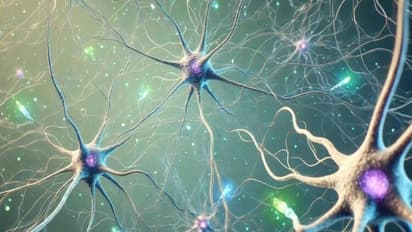Obesity reduces testosterone and sperm count by disrupting brain circuits, new study reveals

Synopsis
Using a mouse model that simulates human obesity, researchers observed that a high-fat diet triggers chronic changes in the brain, leading to a cascade of reproductive dysfunctions — including reduced testosterone levels, lower sperm count, and diminished libido.
A groundbreaking study published in The Journal of Neuroscience uncovers alarming insights into how obesity disrupts male reproductive health by altering vital brain circuitry. Using a mouse model that simulates human obesity, researchers observed that a high-fat diet triggers chronic changes in the brain, leading to a cascade of reproductive dysfunctions — including reduced testosterone levels, lower sperm count, and diminished libido.
This pioneering research sheds light on the critical connection between the brain’s communication pathways, responsible for controlling both feeding and reproductive functions. These findings may explain the prevalent link between obesity and reproductive issues in men.
While it is widely known that obesity lowers testosterone in men, impacting muscle mass, cognition, and fertility, the precise mechanisms remained elusive — until now. The motivation behind this study stems from the surge in obesity-related reproductive challenges, as infertility is becoming increasingly widespread in modern societies.
Obesity’s impact on male fertility manifests in alarming ways: reduced sperm count, poor sperm quality, and diminished testosterone levels. This study aimed to unravel how long-term obesity reshapes the brain’s circuits, offering hope that future treatments could target these specific changes to restore reproductive health.
"A long-term goal of my research is to identify the molecular and cellular mechanisms that regulate reproductive function, which is necessary for the survival of the species," remarked Djurdjica Coss, professor of biomedical sciences and associate vice chancellor for research at the University of California, Riverside School of Medicine, and corresponding author of the study.
Coss emphasized the significance of this research for individuals grappling with unexplained infertility. "Currently, 1 in 8 couples experience infertility and require assisted reproductive technologies to have a child. The studies in my lab may help identify new treatments and strategies to alleviate conditions that contribute to rising infertility rates in both humans and animals."
Also read: Y chromosome's slow disappearance: Are we heading towards a world without men?
The study took a deep dive into the brain’s reproductive circuitry by examining two neuron groups within the hypothalamus — proopiomelanocortin (POMC) neurons, which manage energy balance and food intake, and kisspeptin neurons, vital for the release of luteinizing hormone (LH), a key hormone for testosterone production.
The research revealed that obesity disrupts these neurons' communication, specifically reducing the LH pulse frequency, which leads to lower testosterone levels and decreased sperm production. While the reproductive system retained its ability to function normally under direct stimulation, obesity suppressed kisspeptin neuron activity — a critical link to reproductive health.
A further discovery was that obesity reduces glutamatergic signaling, a process essential for synchronizing kisspeptin neuron activity, worsening reproductive dysfunction in mice fed a high-fat diet. Despite this, artificially activating kisspeptin neurons sparked a stronger LH response in obese mice, suggesting that the neurons weren’t permanently damaged but were suppressed by obesity’s influence.
"The extent of changes was surprising," Coss told PsyPost. "Our studies demonstrated that the brain is the primary site for obesity’s impact on reproductive function. Neurons that regulate food intake and energy expenditure interact with neurons controlling reproduction, since reproduction is an energy-demanding process."
The findings suggest that obesity weakens these crucial neuronal connections, ultimately impairing reproductive health. The reduced synaptic communication between neurons regulating food intake and those managing reproduction may also shed light on why it’s so challenging to curb overeating and lose weight.
Interestingly, while obesity severely affected male reproductive health in the mice, females appeared more resistant to its impact. This aligns with human observations, where men tend to suffer more from obesity-related cardiovascular and metabolic conditions. "We now think females are more accustomed to weight fluctuations due to pregnancy or the need to store more energy while nursing," Coss hypothesized.
However, the researchers caution that the study, conducted on mice, may not fully replicate the complexity of human biology. The long-term nature of obesity is also crucial, as chronic obesity may lead to more severe disruptions in brain function than short-term weight gain.
Moving forward, the team aims to explore how varying durations of obesity affect reproductive health and whether lifestyle interventions, such as diet and exercise, could potentially reverse these negative effects.
"Our goal is to understand the etiology of disease in order to either prevent it or identify treatments," Coss said. "Our studies analyzing sex differences may help us identify protective mechanisms in one sex and use them to protect the other."
The study, titled “Obesity Alters POMC and Kisspeptin Neuron Cross Talk Leading to Reduced Luteinizing Hormone in Male Mice”, was authored by Pedro A. Villa, Rebecca E. Ruggiero-Ruff, Bradley B. Jamieson, Rebecca E. Campbell, and Djurdjica Coss.
Stay updated with the Breaking News Today and Latest News from across India and around the world. Get real-time updates, in-depth analysis, and comprehensive coverage of India News, World News, Indian Defence News, Kerala News, and Karnataka News. From politics to current affairs, follow every major story as it unfolds. Get real-time updates from IMD on major cities weather forecasts, including Rain alerts, Cyclone warnings, and temperature trends. Download the Asianet News Official App from the Android Play Store and iPhone App Store for accurate and timely news updates anytime, anywhere.